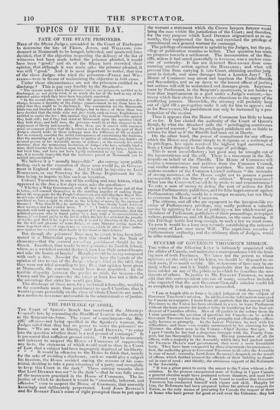TOPICS OF THE DAY.
FATE OF THE STATE PRISONERS.
NY RE of' the fifteen Judges, assembled in the Court of Exchequer to determine the fate of FROST, JONES, and WieroAsts, con- demned at Monmouth to be hanged, beheaded, and quartered, have decided, that if the objection respecting the delivery of the list of witnesses had been made before the prisoner pleaded, it would have been " good ;" and six of the fifteen have recorded their opinion, that although it was made after the prisoner pleaded, it was still " good." And it is most important to notice, that two of the three Judges who tried the prisoners—PARKS and WIT: IJAMS—were in favour of maintaining the objection in bath cases.
Under these circumstances are not the prisoners entitled to a discharge ? This is put very Ibrcibly by the Standard- " The statute under which the prisoners arc, in our judgment, entitled to be discharged, as not fairly tried, is as much the law of the land as any of the statutes under which they have been irregularly convicted. " In the second place, we contend that the prisoners are entitled to a dis- charge, because a majority of the Judges commissioned to try them have de- cided that they ought to be discharged. The commission the the Monmouth trials was not directed to the fifteen Judges, but to three; of these three two have decided that the trials were not fair trials, such as every Englishmau is entitled to under the law : this opinion they held at Monmouth—this opinion they hold still ; but if they had acted at Monmouth upon the opinions which they held there, and bold now, the prisoners would be at this moment in the enjoyment of liberty and security. llow, them, can it consist with common sense or common justice that the la sitation of a few days, on the part of their -Judges, should make to these unhappy men the difference of life or death ? Let us seriously consider the awful consequences of entertaining the doctrine, that the mistiming of a legal objection in matter of substance, can deprive an accused person of his statutable means of defence ; or the scarcely le,: awful doctrine, that the momentary hesitation of Judges who have actually tried a man, shall transfer the decision upon his fate to a majority. of Judges to ho have not tried him, and have not been leg,,Ily authorized to try him. Again we say, it is morally impossible that the senteeces lassed at Monmouth can be carried into execution."
We believe it is " morally impossible." An outrage upon public feeling, such as the execution of these men would be, no Govern- ment in England would dare. And it would be injustice to Lord NoRmAstity, or any Secretary for the Home Department for the time being, to impute to hint such an intention.
Colonel THOMPSON, in one of his striking and racy letters, which appeared in the Soo a few days since, asks the question- " 'Whether a Whig Government, a ith all that is behind them and all that is before, will commit themselves to the startling impolicy of makim, them- selves the scapegoats for the People's discontent, and dabbling their 'loyal Mis- tress's robe with blood on the eve of a ceremony, which 11, lug as we are mo- narchical we have a right to claim ns the holyday of mercy by the custom of thrones:' Vay should they he ambitious to lay three bloody heads between their mistress and her wedded lover. * I boldly maintain here, and myriads will hold up their hands in support of it on any opportunity, that the political prisoner who is found' guilty by a Jury with a recommendation to .1.e.1 .aw Ans a.tamiet. the penalty 'mercy, is sot found guilty of the act to 1 the 1 fl of death ; end that if he is put to death, it is not by direction of the law, hat for the will and pleasure of some .Itt4e. Lr sonic Minister acting upon the same oopuin et views of expediency t r re v..nge, which in other cases induce men against law So imbue their hands in the ldood of their fellows."
But though the prisoners' lives may be saved, it has been inti- mated in a Aiinisterial paper, that this should be the limit of clemency—that the :4A:crest sccunifarg joinishm,.-nt should be in- flicted. Recollect, that wont t be to;nspertati.;11 to Norfolk Island, where, as a wretched convict declared, urea lose their natural hearts and take the hearts of beasts! nangit,!, would be mercy compared with such a litte. No—let the prisoners have the Lenclit of the opinion of two to one of the Judges NVI:0 presi(!ed at the trial, that they were not tried according to law. I lie; that opinion been given at 'Monmouth, the convicts would have been acquitted. In the terrible disparity between the parties to trials for treason--the Crown and the prisoner—let the latter at least lose not a tittle of the advantage that strict law wou1,1 ;,ive hint. The discharge of these men, fur a technical ',diem:day, would in so far contribute more than punishment to quell Chartism, that it would operate powerfully on the class of whom Chartists are made, as a motive to reverence and confide in the administration ofjustice.


























 Previous page
Previous page